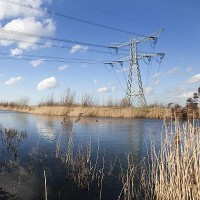Clean energy could stress global water resources

© Peter De Kievith | Dreamstime.com
Climate mitigation efforts in the energy system could lead to increasing pressure on water resources, according to a new study published in the journal Environmental Research Letters. Yet increased energy efficiency and a focus on wind and solar power, which require less water, or the switch to more water efficient cooling technologies could help avoid this problem, the study shows.
The new study aimed to systematically pinpoint the drivers of water demand in the energy system, examining 41 scenarios for the future energy system that are compatible with limiting future climate change to below the 2°C target, which were identified by the IIASA-led 2012 Global Energy Assessment.
“While there are alternative possible energy transition pathways which would allow us to limit global warming to 2°C, many of these could lead to unsustainable long-term water use,” says IIASA researcher Oliver Fricko, who led the study, “Depending on the energy pathway chosen, the resulting water use by the energy sector could lead to water allocation conflicts with other sectors such as agriculture or domestic use, resulting in local shortages.”
The energy sector already accounts for approximately 15% of global water use. According to the study global water use of energy could, however, increase by more than 600% by 2100 relative to the base year (2000). Most of this water usage comes from thermoelectric power plants—centralized solar power plants as well as nuclear, fossil fuel or biomass-powered plants—that rely on water for cooling.
Water use is however not the only problem. When river or sea-water is used for power plant cooling, it gets released back into the environment at a higher temperature, a problem known as thermal pollution, which can affect aquatic organisms. The study finds that thermal pollution will increase in the future unless measures are taken to reduce such pollution through mitigation technologies.
The study highlights the importance of energy efficiency. IIASA researcher Simon Parkinson, who also worked on the study, says, “The simplest way to reduce the pressure that the energy sector puts on water resources is to reduce the amount of energy that we use by increasing energy efficiency. This is especially true for developing countries where electricity demand is set to increase rapidly.”
The study shows the importance of an integrated analysis for understanding interlinked global challenges related to water, climate, and energy. It follows a recent IIASA study showing that climate change impacts on water resources could also affect energy production capacity [http://www.iiasa.ac.at/web/home/about/160104-water-energy.html].
“Our findings have major implications for the way how climate change mitigation strategies should be designed. Energy planners need to put more emphasis on the local water impacts, since they may limit policy choices. Ultimately we need integrated strategies, which maximize synergies and avoid trade-offs between the water and climate change and other energy-related objectives,” says Keywan Riahi, Director of the Energy Program at IIASA.
The new study builds on research conducted for the IIASA-coordinated Global Energy Assessment, and provides an analysis linking water, energy, and climate change mitigation, a focus of several new IIASA research projects.
Reference
Fricko O, Parkinson SC, Johnson N, Strubegger M, Van Vliet MTH, Riahi K, (2016). Energy sector water use implications of a 2-degree C climate policy. Environmental Research Letters 11 034011 doi:10.1088/1748-9326/11/3/034011 http://iopscience.iop.org/article/10.1088/1748-9326/11/3/034011
Environmental Research Letters covers all of environmental science, providing a coherent and integrated approach including research articles, perspectives and editorials.
About IIASA:
The International Institute for Applied Systems Analysis (IIASA) is an international scientific institute that conducts research into the critical issues of global environmental, economic, technological, and social change that we face in the twenty-first century. Our findings provide valuable options to policy makers to shape the future of our changing world. IIASA is independent and funded by scientific institutions in Africa, the Americas, Asia, Oceania, and Europe. www.iiasa.ac.at
Media Contact
More Information:
http://www.iiasa.ac.atAll latest news from the category: Earth Sciences
Earth Sciences (also referred to as Geosciences), which deals with basic issues surrounding our planet, plays a vital role in the area of energy and raw materials supply.
Earth Sciences comprises subjects such as geology, geography, geological informatics, paleontology, mineralogy, petrography, crystallography, geophysics, geodesy, glaciology, cartography, photogrammetry, meteorology and seismology, early-warning systems, earthquake research and polar research.
Newest articles

Properties of new materials for microchips
… can now be measured well. Reseachers of Delft University of Technology demonstrated measuring performance properties of ultrathin silicon membranes. Making ever smaller and more powerful chips requires new ultrathin…

Floating solar’s potential
… to support sustainable development by addressing climate, water, and energy goals holistically. A new study published this week in Nature Energy raises the potential for floating solar photovoltaics (FPV)…

Skyrmions move at record speeds
… a step towards the computing of the future. An international research team led by scientists from the CNRS1 has discovered that the magnetic nanobubbles2 known as skyrmions can be…




















